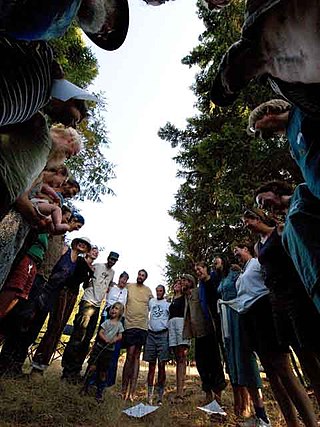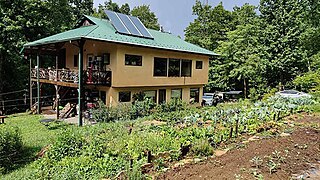
An ecovillage is a traditional or intentional community that aims to become more socially, culturally, economically and/or environmentally sustainable. An ecovillage strives to have the least possible negative impact on the natural environment through the intentional physical design and behavioural choices of its inhabitants. It is consciously designed through locally owned, participatory processes to regenerate and restore its social and natural environments. Most range from a population of 50 to 250 individuals, although some are smaller, and traditional ecovillages are often much larger. Larger ecovillages often exist as networks of smaller sub-communities. Some ecovillages have grown through like-minded individuals, families, or other small groups—who are not members, at least at the outset—settling on the ecovillage's periphery and participating de facto in the community. There are currently more than 10,000 ecovillages around the world.

Rutledge is a village in Scotland County, Missouri, United States. As of the 2020 census, its population was 86.

Cohousing is an intentional, self-governing, cooperative community where residents live in private homes often clustered around shared space. The term originated in Denmark in the late 1960s. Families live in attached or single-family homes with traditional amenities, usually including a private kitchenette. As part of the communal orientation, shared spaces typically feature a common house, which may include a large kitchen and dining area, laundry, and recreational spaces. Walkways, open space, parking, playgrounds and gardens are common examples of shared outdoor spaces designed to promote social interactions. Neighbors also often share resources like tools, babysitting and creative skills.

Twin Oaks Community is an ecovillage and intentional community of about one hundred people living on 450 acres (1.8 km2) in Louisa County, Virginia. It is a member of the Federation of Egalitarian Communities. Founded in 1967, it is one of the longest-enduring and largest secular intentional communities in North America. The community's core values are cooperation, egalitarianism, nonviolence, sustainability, and income sharing. About 100 adults and 17 children live in the community.
Dancing Rabbit is a 280 acres (1.1 km2) ecovillage near Rutledge, Missouri, United States, that was formed in 1997. It has a population of around 30 people who abide by ecological covenants and sustainability guidelines, but are otherwise responsible for their own finances, food, housing, and other necessities.

An intentional community is a voluntary residential community designed to foster a high degree of social cohesion and teamwork. Members typically unite around shared values, beliefs, or a common vision, which may be political, religious, spiritual, or simply focused on the practical benefits of cooperation and mutual support. While some groups emphasise shared ideologies, others are centred on enhancing social connections, sharing resources, and creating meaningful relationships.

Arthur Ernest Morgan was a civil engineer, U.S. administrator, and educator. He was the design engineer for the Miami Conservancy District flood control system and oversaw construction. He served as the president of Antioch College between 1920 and 1936. He was also the first chairman of Tennessee Valley Authority from 1933 until 1938 in which he used the concepts proven in his earlier work with the Miami Conservancy District.

Ganas is an intentional community founded in 1979 in Tompkinsville, Staten Island. Ganas has non-egalitarian, tiered membership groups, and is thus a partial member at the Federation of Egalitarian Communities. The community uses a group problem-solving process called "Feedback Learning", which was begun by co-founder Mildred Gordon. The community attracted press attention after a 2006 shooting incident which led to lurid tabloid headlines. The community was founded by a group of six people, and has grown to consist of 10–12 core group members plus 60 to 70 members of varying involvement. There are three businesses run by Ganas, including a bookstore-cafe.

The Foundation for Intentional Community (FIC), formerly the Fellowship of Intentional Communities then the Fellowship for Intentional Community, provides publications, referrals, support services, and "sharing opportunities" for a wide range of intentional communities including: cohousing groups, community land trusts, communal societies, class-harmony communities, housing cooperatives, cofamilies, and ecovillages, along with community networks, support organizations, and people seeking a home in community. The FIC is a nonprofit 501(c)(3) organization in the United States.
Communities: Life in Cooperative Culture is a quarterly magazine published by the Global Ecovillage Network - United States. It is a primary resource for information, issues, and ideas about intentional communities in North America. Articles and columns cover practical "how-to" issues of community living as well as personal stories about forming new communities, decision-making, conflict resolution, raising children in community, and sustainability.
The following outline is provided as an overview of topics relating to community.

The Abode of the Message is a retreat center in New Lebanon, NY which was founded in 1975 by Vilayat Inayat Khan and a group of his students. The Abode has a long history as a residential community, a centralized location for the Inayati order, a conference and retreat center, and a center of esoteric study. In 2023, its management was transferred to Friends of South Family. The property is located in the eastern heights of the Taconic Mountains in New Lebanon, New York, and includes historic Shaker buildings built between 1834 and 1870.

Diana Leafe Christian is an author, former editor of Communities magazine, and nationwide speaker and workshop presenter on starting new ecovillages, on sustainability, on building communities, and on governance by sociocracy. She lives in an off-grid homestead at Earthaven Ecovillage in the Blue Ridge Mountains of North Carolina, U.S. She has said that living in an intentional community "is the longest, most expensive, personal growth workshop you will ever take," though others are also associated with this quotation and it's unclear who originated it.
The Miccosukee Land Cooperative (MLC) is a cohousing community. It is located near Tallahassee, in northeastern Leon County, Florida.
Kommune Niederkaufungen is one of the largest intentional communities in Germany. Founded in 1986, it is an egalitarian, left-wing, income-sharing commune with consensus decision-making. It is situated in a complex of former farm buildings in the historic centre of the village of Niederkaufungen (Kaufungen), seven kilometres from the city of Kassel (Hessen). It has grown from 15 founder members to 62 adults and nearly 20 children and teenagers (2009). It is a member of "Kommuja", the German network of political communes and egalitarian communities.
Diggers and Dreamers is a group that promotes intentional communities in England, Scotland, Wales and Northern Ireland.

The Yarrow Ecovillage is an intentional community in Yarrow, British Columbia, Canada. Yarrow is a settlement of 3,000 population within the municipal boundaries of Chilliwack, British Columbia. The Ecovillage is a member-designed community that aims to achieve a more socially, ecologically and economically sustainable way of life. The Ecovillage's master plan for the 10-hectare (25-acre) former dairy farm, foresaw three main legal entities: An 8-hectare (20-acre) organic farm, a 31-unit multigenerational cohousing community, and a mixed-use development with just under 2800 m2 of commercial space, a 17-unit senior cohousing community and a learning centre.

Earthaven is an ecovillage in Western North Carolina, about 50 minutes from Asheville.
Kathryn "Katie" McCamant is an American architect, developer and author based in Nevada City, California. She is known for her work introducing the concept of cohousing in the United States, including co-authoring two books which introduced cohousing to the English-speaking world. She has designed, developed and consulted on dozens of cohousing communities across the United States, Canada and elsewhere.













